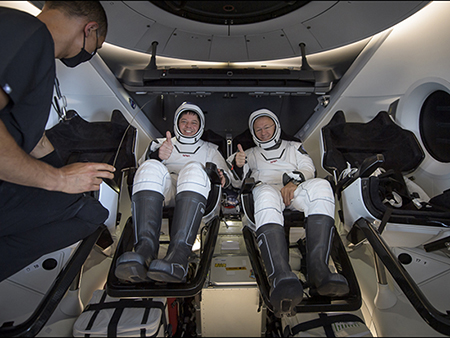
In this photo from the NASA HQ Photo Department, the UAB-made Polar unit is clearly visible beneath the astronauts' legs. Click on the image to view a larger version with the Polar circled in green.When the SpaceX Crew Dragon splashed down safely in the Gulf of Mexico on Sunday, all eyes were on astronauts Robert Behnken and Douglas Hurley, the capsule’s human occupants. But while the world was celebrating their safe return, engineers at the University of Alabama at Birmingham were cheered by another sight — a safely returned Polar freezer, designed and built by the UAB Engineering and Innovative Technology Development team.
The Polar unit, a specialized freezer capable of storing scientific samples at negative 80 degrees Celsius, is prominently positioned beneath the astronauts’ legs in a NASA photo that was widely shared on Sunday. It is one of several cold-storage products currently in use on the International Space Station that were designed and built by EITD engineers. The engineers also continuously monitor each piece of equipment in orbit from their UAB Flight Operations Center.
A second UAB freezer, a Glacier unit, was also in the capsule during Sunday’s landing. While dozens of UAB payloads have traveled to and from the ISS in recent years, these two units have the distinction of being the first UAB products to return to Earth in a crewed water landing. (SpaceX Cargo vehicles splash down in the Pacific Ocean.) The event marked NASA’s first crew water landing since 1975 and was the historic conclusion of the first astronaut trip to orbit on a private company spacecraft.
Quick facts:
- This particular Polar was launched in July 2019.
- The Glacier launched in April 2014 and eventually became part of a record 22 UAB-built payloads on board the ISS at one time.
- The Glacier unit orbited the Earth more than 35,000 times over the past six years and traveled more than 883,500,000 miles — conservatively estimated.
- Even though this trip is over, there is no rest for the EITD team. Once the unit’s payloads are retrieved, the units will return to Birmingham’s Southside, where the EITD team will refurbish them and get them ready for use in future missions.
